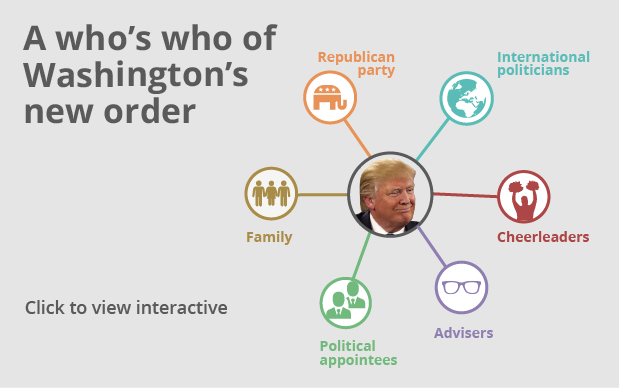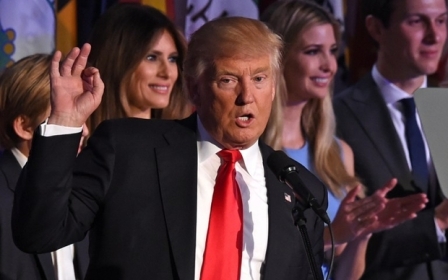Trump's son-in-law Jared Kushner tapped for senior White House adviser role

President-elect Donald Trump's son-in-law, Jared Kushner, will become a senior White House adviser who will work on trade deals and the Middle East, transition officials said on Monday, in a rare case of a close presidential family member taking on a major job.
Kushner, 35, who is married to Trump's daughter Ivanka, is taking the job after receiving legal counsel he would not be violating a US anti-nepotism law based on court rulings that the statute does not apply to the White House. The position does not require US Senate confirmation.
Ivanka Trump, who, like her husband, has been a trusted adviser to the president-elect, will not take on a role in her father's White House but will focus instead on settling her family in Washington.
Senior transition officials and a lawyer for Kushner laid out the arrangement in a conference call with a small group of reporters.
Kushner is to work closely with incoming White House Chief of Staff Reince Priebus and senior strategist Steve Bannon in advising the new president, and the officials said he would focus at least in the beginning on trade policy and the Middle East.
Staunchly pro-Israel
Kushner is the CEO of Kushner Companies and the publisher of right-leaning news website the New York Observer, which ran a widely shared story of a recording where Hillary Clinton says the US should have “done something” about the Palestinian elections in 2006 to make sure that Hamas did not win.
Trump has said his son-in-law, a Jewish American, assisted him with his address to the American Israeli Public Affairs Committee (AIPAC) earlier this year. An editor for Kushner’s website also helped with the speech. Kushner has also fended off accusations of anti-Semitism made against his father-in-law.
"Donald Trump is not anti-Semitic and he’s not a racist," he said after Trump tweeted a picture of Clinton accusing her of corruption with what appeared to be a Star of David.
Much like Trump himself, Kushner was born into an affluent family. His father, Charles Kushner, established the real-estate development organisation Kushner Companies in 1985, turning it into a billion-dollar business.
After Trump's 8 November win, Kushner reportedly asked for access to the daily White House security briefings given to his father-in-law.
The incoming president has vowed to rewrite international trade deals to make them more favourable to the United States, and has adopted a pro-Israel stance with a pledge to move the US Embassy in Israel to Jerusalem from Tel Aviv.
It was revealed in early December that the parents of Jared Kushner have given tens of thousands of dollars to groups in illegal settlements in the occupied West Bank, according to a Ha'aretz report.
Tax forms from 2010-2014 on Kushner’s parents show that their fund – the Charles and Seryl Kushner Foundation – gave $20,000 to the group American Friends in Beit El Yeshive, an organisation that supports programmes in the arch-conservative settlement of Beit El.
Jamie Gorelick, a New York lawyer who served as deputy attorney general for Democratic President Bill Clinton, helped advise Kushner on whether he would violate a 1967 anti-nepotism statute, saying said he would not.
"I'm not saying that there isn't an argument on the other side, and I respect the people who have made the argument on the other side. I just think we have the better argument," she said.
Gorelick said Congress in 1978 authorised the president to hire personnel for the White House office "without regard" to federal personnel laws like the anti-nepotism statute, and that the Justice Department had described that authority as unfettered and sweeping.
Trump's pro-settlement stance
Trump's legal adviser Jason Greenblatt has said the president-elect does not view settlements as an obstacle to peace.
In October, a different Trump adviser said Jewish settlements in the West Bank are not illegal as stipulated by International law.
The international community believes that Israeli settlement expansion in occupied territory is dimming any prospect for the viable state Palestinians seek.
Palestinians have condemned Trump’s pro-Israeli policies, including his promise to move the embassy to Jerusalem.
"Trump's win is an evil prophecy for Palestinian politics," Adnan Abu Amer, a Gaza-based political scientist, told Reuters after the election.
"Trump may seek to marginalise the Palestinian-Israeli file and activate other files such as Syria, Iran and Iraq. That is what Israel wants and what the Palestinians fear."
However, the Israeli right has expressed particular satisfaction with Trump's election victory, viewing it as a sign to resume or accelerate settlement building in the Israel-occupied Palestinian territories, and even the end of the idea of an independent Palestinian state.
Israeli Education Minister Naftali Bennett, a right-wing party leader who backs Israeli settlement building and opposes a Palestinian state, was among the first in Israel to congratulate Trump.
"The era of a Palestinian state is over," Bennett said.
Stay informed with MEE's newsletters
Sign up to get the latest alerts, insights and analysis, starting with Turkey Unpacked
Middle East Eye delivers independent and unrivalled coverage and analysis of the Middle East, North Africa and beyond. To learn more about republishing this content and the associated fees, please fill out this form. More about MEE can be found here.





